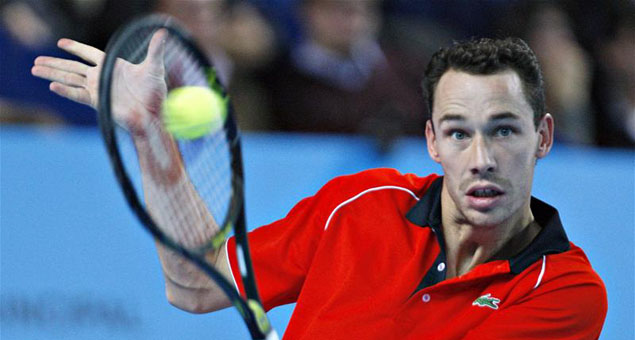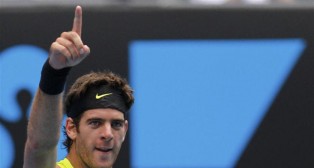Marseilles Open Final Act: Fully Loaded
 At the biggest tournaments in tennis, Michael Llodra is considered a lightweight. At the 2010 Open 13 event in his native country, the left-handed Frenchman lived up to his last name.
At the biggest tournaments in tennis, Michael Llodra is considered a lightweight. At the 2010 Open 13 event in his native country, the left-handed Frenchman lived up to his last name.
Mr. Llodra - make that, Monsieur Llodra - was simply a load over the past week at the Palais des Sports in Marseilles, France.
A man with a modest haul of three career ATP singles titles - none of them in Masters or Grand Slam events - registered championship number four on Sunday afternoon. Unseeded but undaunted, Llodra defeated his doubles partner, Julien Benneteau, 6-3, 6-4, to win the tournament he lost last year to Jo-Wilfried Tsonga in the championship match.
Benneteau - the No. 8 seed in the singles draw - defeated Tsonga in Saturday’s semifinal round, and while that fact might have played a part in giving Llodra an advantage, the most central reality of Sunday’s singles showdown was that the winning player provided a level of tennis that was simply too good for his opponent to match.
The 29-year-old Llodra didn’t back his way into this situation. The floater from Paris knocked off top-seeded Robin Soderling in Friday’s quarterfinals, the kind of conquest that should lead to a deep run at an ATP 250 event. Yes, some will say that he might have had a tougher time against Tsonga, but that argument - if it is indeed articulated - would be similar to saying that Roger Federer was lucky to win the 2009 French Open due to Rafael Nadal’s fourth-round loss.
Two players can meet only once in a tournament. If those two players are slated to meet in the final but only one of them gets there, the successful player deserves nothing but praise as a result. There really isn’t a good reason to place a cloud over a player who makes the final of a tennis tournament, only to draw an opponent who proves to be less than intimidating as Benneteau proved to be on Sunday. Michael Llodra had to get to the final in the first place, and that point cannot be stated enough.
Once he did arrive at the final destination of the Open 13 singles tournament, Llodra didn’t allow a golden opportunity to slip through his fingers.
This writer felt that Benneteau - due to his stellar play against Tsonga and his ability to get off the court first in Saturday’s semis (with Llodra playing second on that day) - would have had an advantage in this final throwdown, but Llodra turned that line of thinking into rubble by blitzing Benneteau from the get-go.
Llodra’s lefty serve was on target throughout this match, as the southpaw hammered 12 aces and put his first serve in the court on 67 percent of his attempts. It’s true that Llodra committed four double faults, but those occasional errors were the product of an intentionally aggressive game that sought to suffocate his less powerful but considerably crafty opponent. Benneteau - as shown in his Saturday slaying of Tsonga - likes to get into rallies and use his defensive skills to win points. Llodra needed to make this a serving match, and that’s exactly what he did… even when he double faulted.
Two more numbers bear out both the wisdom of Llodra’s approach and the effectiveness with which he employed it. For one thing, Llodra won 80 percent of his first-serve points. Given a 67-percent rate at hitting an accurate first serve, an 80-percent conversion rate represents a strong standard of quality. A brief explanation will show why that’s the case.
Since tennis’ unique scoring system demands that a player win a cluster of points by a margin of at least two, it’s not necessary to hit a successful first serve 95 percent of the time. Second serves have their place in this sport, and even the best servers will lose one or two points in almost every game they play.
The key is not to avoid losing a single point; no, the true task for a server is to win four out of every six points, because that rate of efficiency will win a game and, by extension, a match. If a player is hitting 67 percent of his first serves, he’s on pace to win four of six points. If he’s winning 80 percent of the points in which he’s getting his first serve into the court, that means he’s winning at least three points in every service game. Up against this level of serving, a returner must win 100 percent of second serve points just to have a fighting chance. It goes without saying that that’s just not realistic.
The bottom line is this: If a server is hitting 67 percent of his first serves and winning 80 percent of his first-serve points, he’ll be very tough to overcome in anything other than a tiebreak set. (Needless to say, Benneteau couldn’t take either set to a tiebreak on Sunday.)
This leads us to the second big statistic Monsieur Llodra brought to the table in this championship tilt: He never faced a break point in the match. Benneteau got to deuce on multiple occasions in the match’s most dramatic moment, the eighth game of the second set with Llodra serving at 4-3, but the dynamic left-handed serve that dominated the match proved to be too much for Benneteau’s return game.
The most arresting feature of that 4-3 game in the second set could be traced to something mentioned above: namely, Llodra’s willingness to risk a double fault with a big second serve. Indeed, on the final deuce point of that drawn-out game, Llodra cranked a second serve to the wide corner of the service box, drawing an errant return from Benneteau.
That final stroke of boldness allowed Llodra to breathe just a bit more freely, and after he won the next point for a 5-3 lead, the last remaining challenge on the road to a championship trophy had been surmounted. Benneteau held to make Llodra serve out the match at 5-4 in the second set, and that’s exactly what occurred. Llodra held at love with the same big-serving, net-rushing tennis that had worked throughout the afternoon. After an ace whizzed by Benneteau on match point, the result had become official: Michael Llodra owned a fourth career ATP singles crown.
Julien Benneteau had a fabulous week in beating Tsonga and - in Friday’s quarterfinals - the formidable Gael Monfils. In the end, however, Michael Llodra took home the trophy, leaving Benneteau without an ATP title in four career singles finals appearances.
***********************
The day wasn’t a total washout for Benneteau, however. In the doubles championship match played after the singles, the loser of the day’s first competition became a victor in the nightcap. Benneteau and Llodra defeated Julian Knowle of Austria and Sweden’s Robert Lindstedt, 6-4, 6-3. The triumph gave Llodra his 18th career doubles crown. Benneteau - with the victory - earned the sixth doubles championship in his ATP Tour career.
Tags:
No Comments »
No comments yet.
RSS feed for comments on this post.
Leave a comment
You must be logged in to post a comment.




